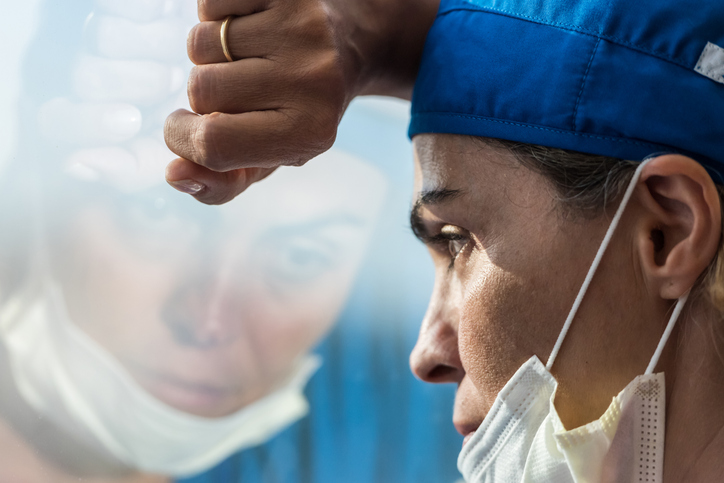
What is the Emotional Cost of Nursing?
There are days when Carol Bemis, APN, RN, arrives home so exhausted she can hardly talk to her husband. Her job as a nurse practitioner with the palliative care program at St. Joseph’s Hospital and Medical Center in Phoenix is supposed to be an 8-to-5 job, but she often doesn’t leave the hospital until 9 p.m.
“When I see many patients in a day, I come home so tired I’m not able to exercise, have time with my family or do some gardening--all the things you need for self- repair,” said the hospice nurse of 13 years. “There’s no time to read journals and update, or to talk to my colleagues.”
Bemis’ story is familiar to many nurses who work long hours and shoulder the concerns and fears of their patients, then suffer the consequences. Experts call it the “emotional cost” of nursing, and some nurses are hit harder than others, depending on their specialty, age and psychological makeup.
“There appear to be many moderating variables, but [reviews of previous studies] suggest that more empathetic nurses showed greater vulnerability to what had been labeled as burnout and secondary traumatic stress," said Jenny Watts, a researcher and psychology doctoral student at the University of Leicester in Leicester, England, in an interview with Health Leaders Media.
Watts will soon begin a project researching the emotional toll of nursing. In a previous literature review, she found that a nurse’s work can leave him or her with problems such as insomnia, emotional detachment, dissatisfaction with work and flashbacks of traumatic events.
Flashbacks are not uncommon for emergency room nurses who experience “critical incident stress,” said Bill Briggs, MSN, RN, CEN, FAEN, trauma program manager at Tufts Medical Center in Boston.
“There are two kinds of stress in the ER--chronic stress from day-to-day dealing with emotional turmoil, and critical incident stress, defined as something horrendous that can cause emotional upset at the time of the incident or later,” Briggs explained.
That “something horrendous” could be a multiple-casualty incident, taking care of someone you know who has been critically injured, a personal threat--which is not uncommon in emergency rooms--or high-profile incidents that are played repeatedly in the media. For Briggs, it was the death of a child.
“It came down to turning off the ventilator and no one wanted to do that,” he recalled. “I ended up doing that and staying with the parents. The physician involved had been nasty to the parents. For a couple of days I had to decide whether I wanted to work at that institution and do that kind of care.”
That experience propelled Briggs to join a critical incident stress management (CISM) team, dedicated to helping nurses work through experiences that are likely to later haunt them and affect their emotional lives. A Web site dedicated to CISM (www.criticalincidentstress.com) suggests that those who experience such events can feel guilty and experience anxiety, depression, anger, inappropriate emotional responses, feelings of being overwhelmed and thoughts of suicide and/or homicide.
Deborah Boyle, MSN, RN, AOCN, FAAN, an oncology nursing consultant in Phoenix, has a term for this particular kind of burnout: “compassion fatigue.”
“It’s different in that burnout is usually related to workplace factors like problems with shifts and getting along with colleagues,” she explained. “Compassion fatigue is more relevant because we’re looking at the emotional ramifications--the ability to cope.”
Little has been written on this topic, said Boyle, a 35-year-veteran of oncology nursing, but nurses can become so enmeshed in the grief of patients’ families that their lives and relationships with family and friends suffer.
“It’s hard to be non-emotional when working with patients with life-threatening diseases,” she said. “The little bit of literature out there on this says that what patients and families are looking for are nurses who are engaged…someone who can help them deal with the immediate emotional crises that cancer causes.”
Most nurses are willing to meet these challenges, but they should have support.
“Leadership must recognize and help nurses deal with emotional issues when they happen, rather than letting them accumulate over time when the grief may become unbearable,” Boyle said. “[Leadership] also needs to give nurses the counseling skills that enable nurses to work effectively with patients and families.”
It appears, however, that this has yet to happen in most facilities.
The Oncology Nursing Society, with a membership of 37,000, recently sent surveys to 300 local chapter presidents asking about the availability of resources like educational programs and specialized retreats for mentally exhausted oncology nurses. The survey indicated that there are few.
“We need to recognize that compassion fatigue is a big factor in retention,” Boyle said.
Young nurses have a particularly hard time with emotional stress, according to Judy Papenhausen, PhD, RN, director of the School of Nursing at California State University, San Marcos, and their well-being depends on how institutions treat these “neophyte” nurses.
“Some cherish their nurses more…and are trying to create centers for nursing excellence and recognize [the difficulties that nurses can have],” she said.
With all the emotional pitfalls, why do nurses continue with their work?
“Nursing provides emotional highs that are terrific,” Papenhausen said. “When you connect with patients, they are so appreciative. There are days I go home from clinical feeling really good after speaking to patients about life issues. There is an emotional cost but also an emotional benefit. Helping a patient turn a corner and control chronic disease is wonderful feeling.”
Bemis, the Phoenix palliative care nurse, accepts the emotional cost of her life’s work because of “the gratification that comes with doing this type of work,” she said. “It helps when I see the comfort that I provide. The smile or thank you is the gift; it keeps me going. That’s why we do what we do.”
Originally published on NurseZone.com.
© 2016. AMN Healthcare, Inc. All Rights Reserved.